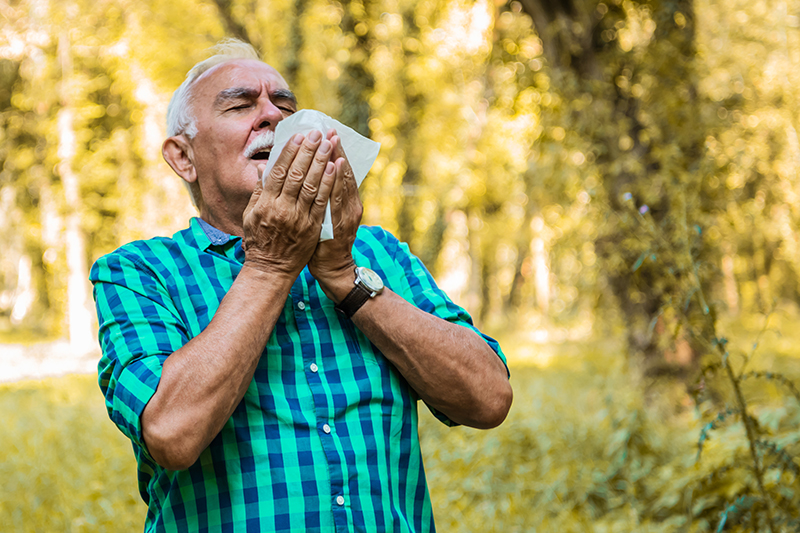
There are many ways for older adults to cope with allergies and avoid potentially dangerous complications.
It’s finally summer! Now that the long, cold winter and wet springtime are over, we can enjoy the great outdoors. For older loved ones, getting out into the fresh air, sunshine, and beauty of nature is very important for both mental and physical health. Unfortunately, it can also trigger seasonal allergy symptoms. And this is just one kind of allergy that becomes more common as people age.
What Types of Allergies Affect Older Adults?
In addition to pollen allergies, which affect millions of people of all ages, older adults are at an elevated risk for the following types of allergic conditions:
- Allergic reactions to insect bites or stings
- Skin allergies
- Food and medication allergies
Because allergy symptoms can be extremely dangerous and even potentially fatal, it is crucial to understand the specific allergies impacting an individual and what treatment plans are available. It begins by scheduling an appointment with the primary care physician to see if allergy testing is warranted. If so, a referral will be made to an allergist, who is able to test for an array of potential allergens and prescribe an appropriate treatment plan.
Common Allergy Symptoms and Effective Ways for Older Adults to Cope With Allergies
Here’s what an older adult may be experiencing during an allergic episode, and what the allergist may recommend to help:
- Skin allergies: With thinner, drier skin, older adults are usually more subject to allergic reactions to poison sumac, ivy, or oak, along with skin care items such as lotion and soap. Itchy, red, or swollen skin can be soothed with topical steroids and ointments and/or antihistamines. Scratching will likely make the symptoms worse. If you notice a rash that spreads quickly or is causing pain or any kind of green or yellow discharge or fever, get medical help immediately.
- Allergies to pollen: Standard symptoms include itchiness in the throat, nose, and eyes, coughing, sneezing, and nasal congestion or a runny nose. Over-the-counter nasal steroids which can be sprayed directly into the nose are usually highly effective. It is also helpful to monitor pollen levels. On days when the pollen count is high, encourage older adults to stay in an air-conditioned environment.
- Insect allergies: The venom from fire ants or bees can cause redness, pain, and swelling. When the immune system overreacts, however, serious symptoms like dizziness, nausea, shortness of breath, coughing and more can occur, along with anaphylaxis – as quickly as five minutes after a bite or sting. Call 911 right away if a severe reaction is noted in a loved one.
- Allergies to food: Just like insect allergies, food allergies can result in dire consequences. The most common allergy-inducing foods include tree nuts, soy, wheat, milk, eggs, shellfish, and peanuts. Food allergy symptoms vary from congestion and sneezing to hives and itching, vomiting, diarrhea, and anaphylaxis. Prevention is important. The allergist may provide an epi-pen for the person to carry at all times and use at the first indication of an allergic reaction to food.
- Allergies to medications: Insulin, antibiotics, antiseizure and nonsteroidal anti-inflammatory drugs, and anything containing iodine are common allergy-inducing medications. Symptoms can vary widely but can include hair loss, swelling, breathing problems, vomiting or diarrhea, nausea, and itching. Consult with the doctor as soon as possible if an allergy to a medication is suspected.
At Grace Home Care, our care providers are skilled in recognizing and reporting any changes in condition immediately. Contact us at 785-286-2273 to learn more ways we can help the older adults you love stay safe, healthy, and thriving with our award-winning home care services throughout Topeka.
